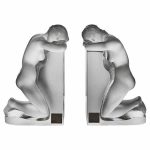Dear Lee,
Years ago we were listed in a book of experts who could appear on radio and TV talk shows. I was listed under the topic “Collections.” My first caller asked me to be the expert for the day on collecting alimony and on how to avoid debt collectors. It took a minute for me to realize they dealt with a different kind of “collections.”
Now it has happened again. I was at a college board of trustees meeting yesterday and heard all about the technicalities of research, emotions, contacts and (of course) money that are part of “collecting” during a fundraising drive. But as I listened, I realized they could have been talking about my kind of collecting. You can’t get what you want if you don’t look for it and ask for it. (No one donates money if no one asks for it.)
Some things attract us for emotional reasons—memories of a person, a place, a smell or the good old days at college. Sometimes we unemotionally trade or sell for tax reasons or for profit. We may create a collection that is so large or important it gives us name recognition just the way a big donor at a college gets a name on a building for a million-dollar donation. Often college donors want to leave a legacy, perhaps a scholarship that includes the donor’s name.
Collectors like us sometimes give pieces to museums and historical societies to see our names in the case near the antiques. And sometimes we want to “give back.” We have enjoyed our collections and the friendships we’ve made and want to encourage others who are part of the hobby. Fundraisers try to build “relationships” to encourage gifts of money. A big part of the fun of our kind of collecting is just that: relationships and friends who understand our obsessions. I have never been good at collecting money for a charity, but I can encourage everyone to enjoy the lifestyle that includes our kind of collecting—and our kind of giving back.




Leave a Reply
You must be logged in to post a comment.